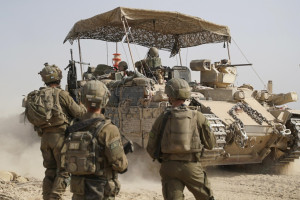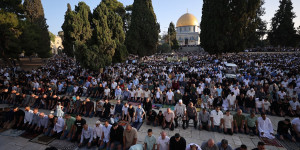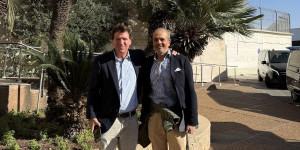IDF general warns against politicization of military, stresses need for large conscription military & 'warrior ethos'
Maj. Gen. Asor says ultra-Orthodox draft is 'historic opportunity that we must fully exploit'

The commander of the IDF's Southern Command, Maj.-Gen. Yaniv Asor recently wrote an article sharply criticizing the way politics had influenced the IDF, damaging the public's trust in the military, and warning against the serious manpower shortage currently facing the military, Army Radio reported on Wednesday.
In an article titled “The strategy of the people in the IDF in light of the lessons of ‘Iron Swords’,” Asor discusses the failures of the defense establishment before the war, the loss of public trust in the IDF, the dangers of politicization, as well as the shortage of soldiers amid the background of the Haredi Draft controversy.
Asor noted the need to strengthen public trust in the IDF after the failures of Oct. 7, 2023, which he blamed partially on the politicization of the service, which penetrated the ranks of the army.
“Israeli society is in a long process of identity clarification and deep social disagreement,” Asor wrote. “To our detriment, the IDF serves as an arena for competition between various political and ideological agendas, which have intensified in recent years and have damaged the IDF and public trust.”
Asor stated his opinion that “the IDF is required to be state-based, free of agendas and apolitical, and acting harshly against those who deviate from this.”
In his article, the general identified a concept that, according to him, was a substantial part of the Oct. 7 failure: a loss of a fighting spirit, which led the military to prefer remote systems, electronic defense, and avoiding ground maneuvers.
“At the heart of the concept was the feeling of the heads of the defense establishment and the army that there was a resilience problem in Israeli society that was unable to bear the costs of war,” Asor explained. “Therefore, concepts were formed that 'bypassed' the problem, such as the rise of the prestige of warfare based on intelligence superiority and counterfire; hence, the suppression of ground maneuver.”
“The idea of a 'small and smart army' is another clear expression of the manpower concept,” Asor continued. “The government's decision to shorten service from 36 months to 30 months, the closure of units and brigades mainly in the ground forces, exemption from reserve service with permissiveness, limitations on the length of service in the Reserves Law, exemption from service at the age of 42, and more.”
He argued that the IDF needs to adapt its ideas and doctrines of war to the realities exposed by the Iron Swords War.
“The scope of the war, its duration, its lessons and its security challenges require us to adopt a large, smart, trained, equipped and budgeted army approach,” he argued.
Maj.-Gen. Asor identified other components of the "manpower concept" which were revealed in a series of moves by the IDF in recent years.
This included a focus on technological service, the replacement of the ethos that "The whole nation is an army" with a "small and smart army” and an increased focus on “intelligence, cyber, and defense units.”
Asor also argued that “the warrior ethos that was expressed in the concept of 'every man is fit to fight' has been eroded by the ethos of 'significant service' and technology.”
Instead of the concept of vigilance, such as that found in Psalm 121 “The keeper of Israel neither slumbers nor sleeps,” he noted that “the IDF has implemented a 'week of silence' several times a year.”
This refers to a general reduction of manpower for several days to allow soldiers to spend the high holidays with their families, which, for example, also happened during Simhat Torah, the holiday that was being observed on Oct. 7, 2023.
He accused the IDF of trying to be like a high-tech business: “In a leading technological unit that competes with the high-tech world, they developed a similar service concept, encouraging early departures home during the week, which was given the name 'personal Tuesday.’”
On the issue of the reserve service, General Asor said the reservists had become the "serving minority" in Israeli society, arguing it is necessary to increase their compensation compared to those who do not serve.
"A reality according to which there is no equality on the side of duties, but there is no noticeable preference for serving members in terms of rights - creates dangerous discrimination (against) the serving minority,” he wrote.
Asor also addressed the issue of ultra-Orthodox recruitment saying, “In the current and emerging reality, the recruitment of ultra-Orthodox is a clear security need. The ability to integrate ultra-Orthodox members into the IDF, through which they can develop social brotherhood as well as other values, is a historic opportunity that we must fully exploit.”
He noted that present security issues demonstrate the continuing need for a military conscription service, and not a voluntary service.
“The multi-scene war in which we are engaged has brought security issues back to the forefront, and especially the recognition of the need for a large, smart, well-equipped, and budgeted army in which we can place our trust,” he wrote.
“Therefore, it is right to establish the ethos of a conscripted, not a volunteer, serving nation.”

The All Israel News Staff is a team of journalists in Israel.
You might also like to read this:















